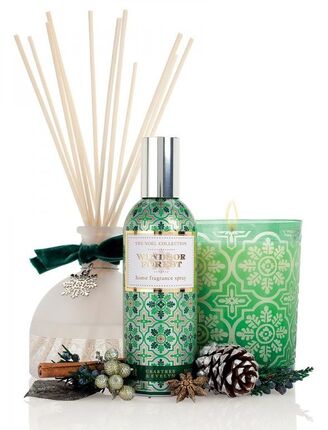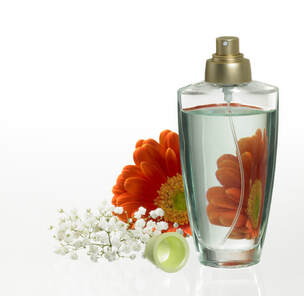|
The mindful way to stop and smell the roses
By Luke Vorstermans This is not a blog about why you should stop and smell the roses. I mean, you should heed that advice for your own health and well being, but I want to bring your attention to what it is that you are actually doing when you are engaged in smelling those roses. Sitting smack in the middle of your face is your unadorned, and under-appreciated nose – your sense of smell. I won’t get into all the dynamics of how the scent of a rose delivers that, “Aaaaaah” sigh of scent pleasure, but there is something you should know about your sense of smell that will bring a new, elevated relationship with this enigmatic sense.  Whether it’s the aroma of a fruitcake baking in the oven, smoked gammon or stuffed turkey, the festive season has its own, characteristic smells. With the COVID pandemic keeping traditional holiday travel and entertaining to a minimum -- if at all -- you can emphasize the nostalgia and sentiment of Christmas throughout your house with essential oils in diffusers in the 12 scents of the season.  ANGER, anxiety, excitement and joy are just a few of the many emotions people can experience. By Sandra Visser Our emotions (what we feel) constantly change and are complex. With so many emotions it’s understandable that at times we struggle to know which emotion we’re feeling but also to control the one we’re feeling. Emotions can be triggered by a thought (internal stimulus) or something that happened (external stimulus). Emotion is often the driving force behind our actions – negative or positive. Our emotions are like internal switches that spur us to action. Thoughts follow shortly after we’ve experienced an emotion. We feel first, then we think. Emotions are activated to trigger survival techniques such as the fight, flight or freeze response. It happens on a subconscious level.  In short, smells are the most powerful trigger of emotions and memories. And it now seems they are also vital for health and wellness. by Elsa Kruger What happens when I smell my Cacharel Anais Anais? I remember the scent of my mother when I was home for the university holidays. A whole nostalgic picture of our house, the kitchen, the family around the dining-room table, and the lush garden and large lawn opens up in front of me, more than 40 years later. Suddenly it doesn’t sound so soppy to say, ‘Take time to smell the roses’. Your emotional and physical wellbeing depends on it, according to science. In short, smells are the most powerful trigger of emotions and memories. And it now seems they are also vital for health and wellness.  The use of fragrance in commercial spaces is widespread – spas and department stores have used it for years to tap into consumers’ brains. But now it is being taken a step further. By Elsa Kruger Many companies are spending money to have their own scents developed, which their clients can associate with their business. It has apparently been shown that consumers spend up to 15 minutes longer in places that smell good. Some international boutique hotels now offer guests a scent menu to personalise the aroma of their room. Or you can take your favourite tropical island’s aroma home with you, in the form of a candle, oil or skincare product that transports you back to that blissful experience. In the cosmetics industry there has been an impact as well: The longer women can smell their hair products, the more likely they are to stay loyal to the brand. Some hairdryers have even been designed to infuse the scent of jasmine or rose into the hot air!  The right scent adds to an atmosphere can add a sense of calm and contentment at a time where Covid-19 is causing grief and stress everywhere. By Elsa Kruger The interior of your house is a reflection of your personality. Your space is not only about how it looks, but also how it smells. Because of COVID-19, most people have spent a large part of this year at home. It has made us more aware of our inner need for a warm sense of security and homemaking. Scented house items like perfumed candles, diffusers and aromatic oil burners experienced a high point in online sales and are popular gifts. The right scent adds to an atmosphere of calm and contentment.  the whiff of coffee gives you a boost because your brain links it to the double shot latte you’ll soon be downing. And a certain perfume makes you glum if you wore it in a toxic relationship. By Lydia House and Iantha Yu It’s one of the few senses that’s already fully developed by the time you’re born. But while your sense of smell may have evolved to alert you to predators, these days, researchers are more inclined to investigate how the power of scent can be harnessed to change your mood, for the better. “All but a few human responses are learnt – how we relate to and are impacted by scent included,” explains Professor Charles Spence, head of the Crossmodal Research Laboratory at Oxford University. “For some smells, your reaction is down to past exposure and whether that led to reward or a different consequence.” So, the whiff of coffee gives you a boost because your brain links it to the double shot latte you’ll soon be downing. And a certain perfume makes you glum if you wore it in a toxic relationship.  A scent has no personal meaning until it is associated with something that is meaningful. By Elsa Kruger One can quite rightly say that scent is the brain’s muse. The hidden power of fragrance is that it has a positive effect on your state of mind and mood; it relieves stress, boosts self-confidence and improves sleep patterns as well as physical and mental performance. Aromatherapy has been a huge trend in the wellness industry for a number of years already. Research at the Sense of Smell Institute under the umbrella of the Fragrance Foundation in the US shows that you can improve your health and well-being by being aware of how certain aromas affect you personally.  Older people who did smell training not only improved in odour identification but also in cognitive functions . By Ben Jhoty In recent years it’s emerged that loss of smell is one of the earliest signs of dementia.US research shows older people who have difficulty identifying common odours are twice as likely to develop dementia in five years compared to those with no significant smell loss. Bizarrely, the smell of peanut butter is one of the first smells to go. But here’s the thing: smell training could not only reverse declining olfactory ability but also help prevent neurodegenerative diseases like dementia, Alzheimer’s and Parkinson’s. |
Breaths comes in pairs except for two times in our lives – the beginning and the end. Archives
January 2021
|
Navigate: |
Quick Links: |
Location: 108 Mile Ranch, BC
|
Copyrights©2018, All Rights Reserved by SNIFFngo Aromas


